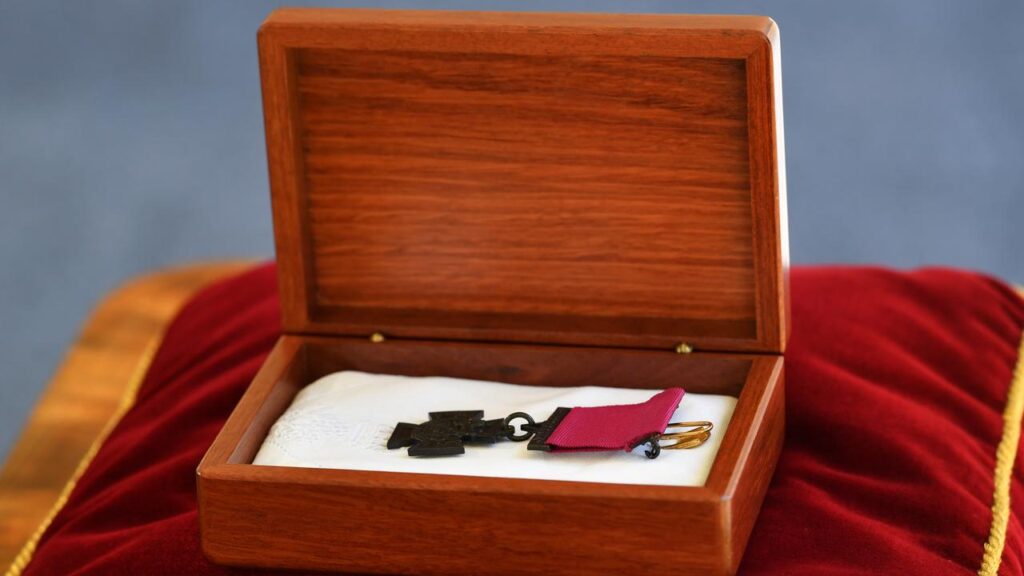Remembrance eve glimpse of rarest bravery honour
Rachael Ward |

Deep in the halls of the Australian War Memorial lies a collection of medals symbolising bravery so rare only 102 have been awarded in more than a century.
On the eve of Remembrance Day, Australians are being given a scarce glimpse in a new video recording shared with AAP of the largest assortment of the nation’s highest military honour.
“The Victoria Cross, which ranks next to the George Cross, is considered the most prestigious award that can be bestowed on an individual for valour in the face of an enemy,” Australian War Memorial director Matt Anderson says.
The memorial houses some 75 of 102 medals awarded to Australians, with just six given out since 1991, when Australia created its own VC separate from the British military honours system.
Previously, British military authorities determined recipients but that is now done through the Australian Defence Force honours system, approved by the governor-general and endorsed by the King.
Created to be given to any member of the force regardless of rank, more than half bestowed on Australians were earned in World War I and nine during the ill-fated and nation-defining Gallipoli campaign.
Forged from the world’s most expensive bronze, all medals are made at the same high-end jeweller in the heart of London, Hancocks and Co in Mayfair.

It is widely believed the bronze used to make the medals originally came from a Russian gun captured during the Crimean War in the mid-1800s.
That eventually ran out and since 1914 the bronze has been sourced from two Chinese guns, says Australian War Memorial curator Cameron Ross.
“Those two cannons have been the source of the metal ever since,” he notes.
“That piece of bronze associated with the guns that create the Victoria Crosses make that probably the most valuable piece of bronze in the world today.”

Each medal is inscribed with the words FOR VALOUR and hung from a crimson ribbon.
“Most medals before the Victoria Crosses were very ostentatious, so they look like they’re encrusted with jewels,” Mr Ross says.
“The Victoria Cross is specifically designed to be very different to that, to be available to the lowest of soldiers, to the highest of generals.”
Just 102 Australians have received the award since federation, the first being Captain Neville House of the NSW Medical Staff Corps, who rescued a wounded man under heavy fire during the Boer War in South Africa in 1900.
Australia’s oldest living recipient, 92-year-old Vietnam veteran Keith Payne AM, was awarded the VC in 1969.

He received his honour from Queen Elizabeth aboard the Royal Yacht Britannia in Brisbane the following year, was awarded the Medal of the Order of Australia in 2006 and was advanced to a Member of the Order of Australia for his services to the veterans community in 2015.
The most recent Victoria Cross awarded was posthumously given to the late Richard Nordern VC for gallantry during the 1968 Battle of Fire Support Base Coral in Vietnam.
Four have been bestowed upon soldiers who served in Afghanistan including Ben Roberts-Smith, the disgraced SAS trooper later found by the High Court to be a war criminal in civil lawsuits prompted by investigative reporting. Roberts-Smith retains his VC.
Dozens of medals loaned to the memorial are on display for public viewing and the stories of each Australian recipient are told in the Hall of Valour.

KEY FACTS ABOUT THE VICTORIA CROSS
* The Victoria Cross, the highest award for acts of bravery in wartime, was created by Queen Victoria in 1856 and made retrospective to 1854 to cover the period of the Crimean War.
* The Victoria Cross for Australia was approved on January 15, 1991, as the pre-eminent gallantry award in the Australian system.
* The bar is decorated with laurel leaves and bears a V from which the cross hangs.
* It is awarded for conspicuous gallantry, daring, valour, self-sacrifice or displays of extreme devotion to duty.
* 102 Australians have been invested as VC recipients.
* Four Australian soldiers have been awarded the VC for service in Afghanistan: Corporal Mark Donaldson (2009), Corporal Ben Roberts-Smith (2011), Corporal Daniel Keighran (2012) and Corporal Cameron Baird (2014).
* Australians were awarded the British Victoria Cross in the Boer War, First World War, North Russia, Second World War and the Vietnam War.
AAP